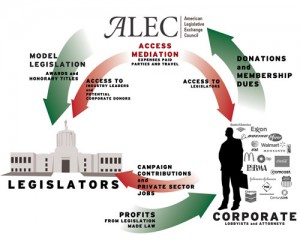 Under fire for Florida’s “Stand Your Ground” law and reeling after the recent loss of support from Pepsi, Coca-Cola, and Kraft Foods, the American Legislative Exchange Council (ALEC) announced today that they would begin focusing their efforts solely on economic issues, rather than social and cultural issues. The news that the group—a shadowy organization known for legislative ghostwriting—is eliminating a task force responsible for writing laws about gun control, voter ID, abortion, and immigration was called “a major concession.” ALEC is one source of state anti-immigrant bills like Arizona’s SB 1070 (which will head to the Supreme Court next week) and Alabama’s HB 56 (now undergoing revision in the state legislature).
Under fire for Florida’s “Stand Your Ground” law and reeling after the recent loss of support from Pepsi, Coca-Cola, and Kraft Foods, the American Legislative Exchange Council (ALEC) announced today that they would begin focusing their efforts solely on economic issues, rather than social and cultural issues. The news that the group—a shadowy organization known for legislative ghostwriting—is eliminating a task force responsible for writing laws about gun control, voter ID, abortion, and immigration was called “a major concession.” ALEC is one source of state anti-immigrant bills like Arizona’s SB 1070 (which will head to the Supreme Court next week) and Alabama’s HB 56 (now undergoing revision in the state legislature).
Here’s the statement from ALEC National Chariman David Frizzell (also currently an Indiana State Representative):
Today we are redoubling our efforts on the economic front, a priority that has been the hallmark of our organization for decades. Fostering the exchange of pro-growth, solutions-oriented ideas is precisely why ALEC exists.
To that end, our legislative board last week unanimously agreed to further our work on policies that will help spur innovation and competitiveness across the country.
We are refocusing our commitment to free-market, limited government and pro-growth principles, and have made changes internally to reflect this renewed focus.
We are eliminating the ALEC Public Safety and Elections task force that dealt with non-economic issues, and reinvesting these resources in the task forces that focus on the economy. The remaining budgetary and economic issues will be reassigned.
And some commentary from FireDogLake’s David Dayen about why this was coming:
This is a no-brainer for ALEC, which has been hemorrhaging support from its corporate underwriters. The corporations, particularly those with consumer-oriented businesses, had been fleeing because they didn’t want to be tarred by ALEC-modeled legislation like Florida’s Stand Your Ground law or voter ID legislation that makes it more difficult for poor people to vote. Reorienting back to the economic sphere won’t entirely solve the problem, but it keeps their corporate underwriters from being forced to defend legislation far afield of their core business. They can at least pretend now that they merely support ALEC as part of a pro-growth strategy to create jobs…
State-based progressive groups have become more aggressive at exposing ALEC, however, as an organization advancing “bills written by corporations for corporations.” Isolating their focus might help ALEC deflect attacks on their social agenda, but it makes it more of a corporate front group, and vulnerable to that kind of criticism.
Dayen also mentions that other groups will still be around to write up and shop out social legislation to different states—the Concerned Women for America and the Susan B. Anthony List both have written anti-abortion legislation in the past, for example. But if this means that a major source of corporate-funded, lobbyist-sponsored, fear-driven legislation is exiting the picture…it’s big news.

